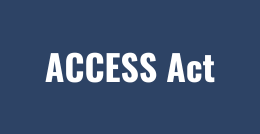On December 11, 2023, CCPA sent the following letter to the U.S. House Committee on Ways and Means regarding the Health Accelerating Consumer Care by Expediting Self Scheduling (ACCESS) Act:
The Honorable Jason Smith
Chairman, U.S. House Committee on Ways and Means
1139 Longworth House Office Building
Washington D.C. 20515
Dear Honorable Jason Smith:
The Chronic Care Policy Alliance (CCPA) urges you to support the Health Accelerating Consumer Care by Expediting Self Scheduling (ACCESS) Act. The Health ACCESS Act will remove barriers to deploying technology that can accelerate patients’ access to care, which will reduce harmful and costly emergency room overutilization.
The CCPA is a network of state and regional advocacy organizations advancing public policy that improves the lives of those living with chronic conditions and diseases. CCPA is dedicated to achieving better access to quality, affordable health care.
The Health ACCESS Act would provide the necessary legal ability for our hospitals, health systems, and solo practitioners to partner with online health information services that increase capacity within a constrained healthcare workforce. As demand for care is on the rise, one in five healthcare workers has quit their jobs since 2020, which makes it more difficult for people living with chronic conditions to access the care they need. While we appreciate Congress’ efforts to address burnout and expand the supply of healthcare workers in the long run, we can and must begin to make better use of the resources available today.1
Roughly 20 to 30 percent of a provider’s time goes to waste due to last-minute reschedules or cancellations.2 By leveraging scheduling technology to manage providers’ real-time appointment availability, patients can book a same-day in-network doctor visit in an ambulatory setting rather than the emergency room. This also allows care organizations to optimize the use of their providers’ time.3
Passing the Health ACCESS Act will also accelerate and improve patients’ access to specialized and high-quality care. Unfortunately, a 2022 survey of physician offices found that patients were waiting an average of 26 days for a new appointment, a number that has steadily increased.4
Such long wait times often exacerbate morbidity and mortality for patients with preventable or treatable conditions.5 Long wait times also force patients into unnecessary emergency room visits, which are on average 12 times more costly than treatment in an office setting.6
The Health ACCESS Act would make a simple adjustment to the Anti-Kickback Statute (AKS) to enable greater adoption of modern technologies that can help solve systemic problems. Under current law, there is no distinction between illicit referral practices and scheduling services that simply reduce patients’ barriers associated with accessing necessary and appropriate care. The Health ACCESS Act would remove this regulatory ambiguity, allowing digital health and appointment booking platforms that respect neutrality, non-discrimination, and transparency to innovate. This would optimize both provider capacity and accelerate patient access.
We urge you to support the Health ACCESS Act to allow patients to take advantage of modern scheduling systems, address the healthcare workforce shortage, and streamline and accelerate our access to care. Thank you for your attention to this important matter.
Sincerely,
Liz Helms
Founder and Director, CCPA
1https://www.mckinsey.com/industries/healthcare/our-insights/revisiting-the-access-imperative#/
2https://www.mckinsey.com/industries/healthcare/our-insights/revisiting-the-access-imperative#/
3https://www.zocdoc.com/about/news/2019-er-report/


